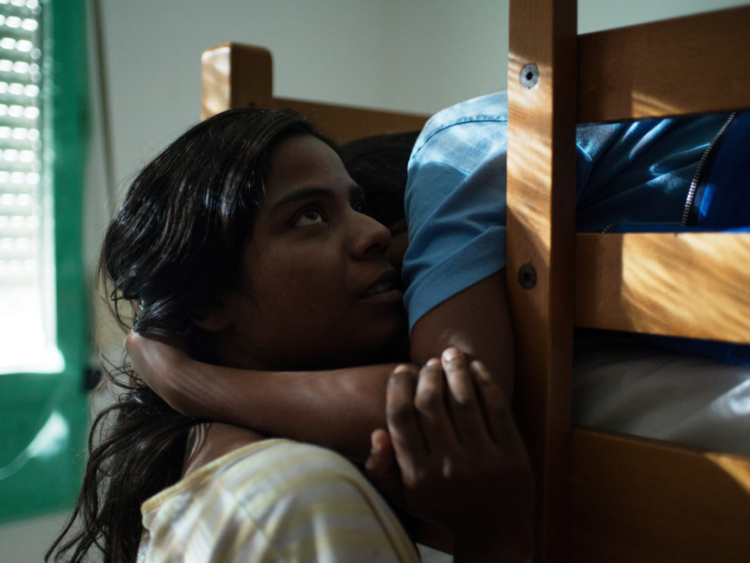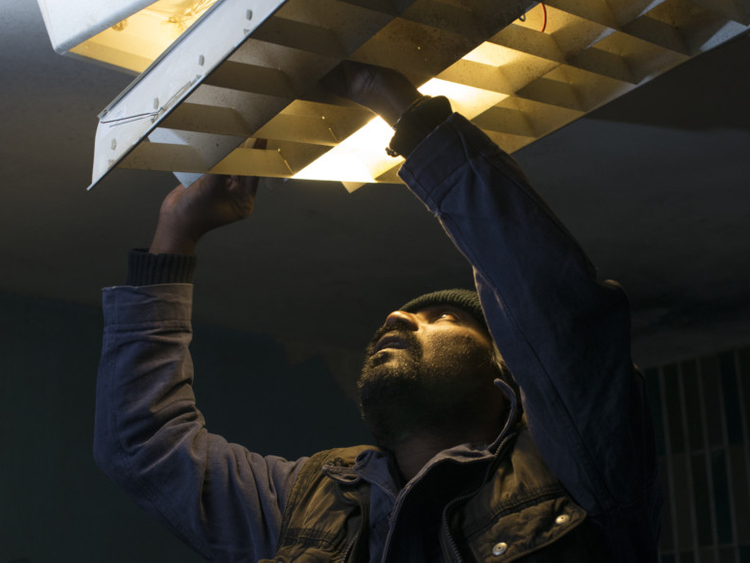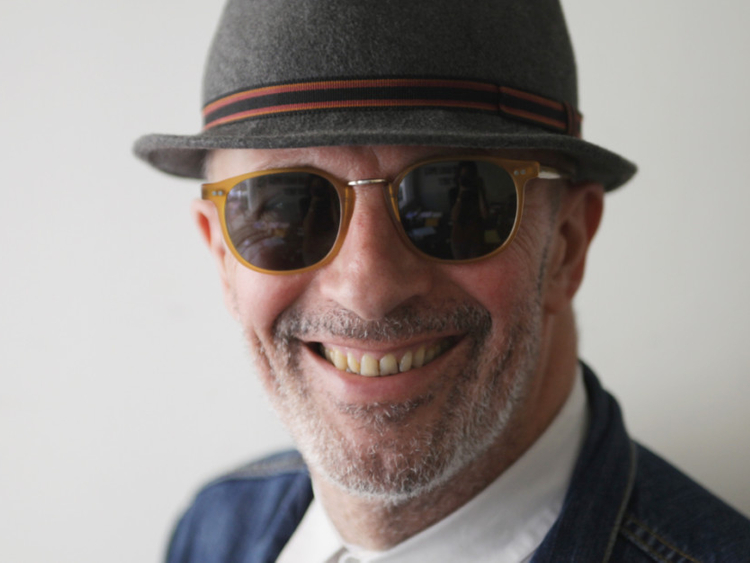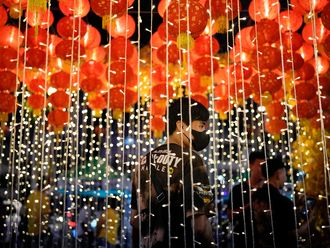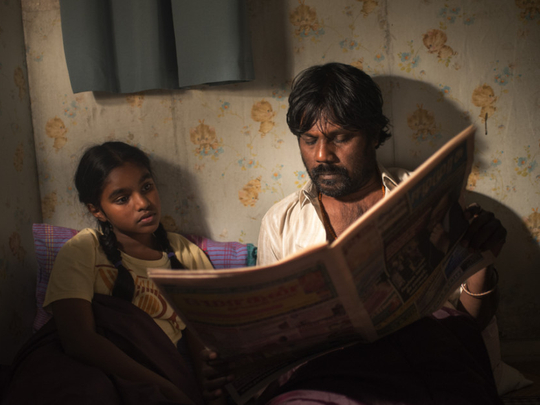
So you’re a film director and your latest work wins the Palme d’Or in Cannes — what do you do with your trophy? Place it, in all its leafy glory, in prime position on your living room mantelpiece? Hide it in a bank vault? Let it grace your producer’s office? In a spirit of idle inquiry, I ask French director Jacques Audiard. He half turns and casually waves his hand at the cafe behind him. “My awards are all over there in the drinks cabinet.”
It’s only once our interview is over that I realise he’s serious. We’re sitting in the upstairs bar at a cinema off the Boulevard Saint-Michel in Paris, owned by Why Not Productions, the company that Audiard has worked with for several years. And there indeed, in pride of place, is the 2015 Palme d’Or for his latest film, “Dheepan”.
It’s one of several awards — there are Baftas, too, and some of France’s much-prized Césars — gleaming in a sort of coffee table made of what I’m told is strongly reinforced glass. Audiard’s recent awards are all there for public scrutiny, although another French director from the same stable apparently insists on keeping all his at home. Audiard used to do so, he says, until burglars stole four of his Césars.
If you’re aware of the work of any contemporary French director, it’s probably Jacques Audiard — even if you don’t know the name. At the very least, you may have noticed his look. A dab hand at projecting an image, Audiard, 63, has established himself in people’s minds as the director who most resembles a 1950s detective; he’s usually seen with a fedora on his close-shaven head, sometimes sucking on a pipe, making him resemble a hipster Maigret.
Why the hat, I ask him: is it his tribute to US film noir, or to the dapper numbers worn by Alain Delon and his ilk in the classic French thrillers of the 1950s and 1960s? “No,” says Audiard, whose manner is soft-spoken, considered, and often with a faint edge of wry mockery. “It’s because I’m bald. I just like hats. Maybe it’s an affectation — but it’s better to be elegant than not.”
Today, however, Audiard has arrived wearing a woolly cap carrying the Why Not? logo — a touch more street than usual, in keeping with “Dheepan”’s gritty gang-war theme. But the rest of his outfit is altogether nattily Left Bank — two snug layers of North Face winterwear, and a Hermès-style cravat, knotted (and here’s the crowning effect, what you might call le French touch) on top of a tie.
Among current French auteurs, Audiard has been the most successful at making films that keep their hard-edged arthouse credentials while connecting with a wide, more mainstream international audience. It’s partly because his work has much in common with American crime cinema: his films aren’t always thrillers as such, but they invariably carry an underworld or lowlife bass note, and are intense, moody essays on transgression and living dangerously.
“Read My Lips” (2001) was about a deaf female office worker who takes up with a career criminal; “The Beat That My Heart Skipped” (2005) was a quasi-remake of James Toback’s 1978 thriller “Fingers”; and, most famously, “A Prophet” (2009) was a prison drama that charted the rise of a “Scarface”-style criminal who happened to be Arab. It made a star out of its then unknown lead, Tahar Rahim, and contributed substantially to making French cinema a less white middle-class concern.
A kinetic, dramatically and visually gritty (not to say grubby) drama of death, violence and survival, “A Prophet” easily could, and arguably should, have won the Palme d’Or when it competed in Cannes in 2009. As it is, Audiard’s first Palme is the powerful, brilliantly achieved, if flawed “Dheepan”. It’s about a family of Tamil immigrants newly arrived in Paris — except that they’re not really a family, but refugees clinging together for survival.
Yalini is a woman who ensures her passage out of war-torn Sri Lanka in 2009 by finding a young girl to pose as her daughter, while the man who plays her husband — under the assumed name Dheepan — is a Tamil Tiger combatant fleeing after the defeat of his movement. The film shows the three trying to subsist as a family in France, where they find themselves living on a tough gang-run housing estate.
Why did Audiard want to make a film about Tamils — what’s more, a French film largely in the Tamil language? He didn’t, he says. When he first started planning “Dheepan”, immediately after finishing “A Prophet”, he knew nothing about Tamils. The idea was to attempt a remake of Sam Peckinpah’s “Straw Dogs”.
“I had this idea of immigrants arriving on an estate, being taken hostage and so on. Then I watched the Peckinpah again, and ... well, I couldn’t quite see why I’d had the idea in the first place. But I had this idea of people coming to France who had no connection with the old colonial empire, so had no reference points in terms of language or culture.”
Then Noe Debre, one of “Dheepan”’s co-writers, announced that he had met some Tamils and brought Audiard up to scratch on the Sri Lankan civil war, which he says received little coverage in the French media. That got Audiard researching his theme. “There is a Tamil community in Paris, but not a very big one, and it’s still experiencing all the tensions of the conflict. They’re a little paranoid. It’s hard to really get to know them.”
Nevertheless he did get to know some Tamils, notably the non-actor he chose to play Dheepan. Antonythasan Jesuthasan is himself a former Tiger, who had been forcibly recruited as a soldier in his early teens, but later denounced the organisation; he’s now best known as a novelist under the name of Shobasakthi. Because of his past, he wasn’t entirely trusted in the Parisian Tamil community: “When people found out I’d been in touch with him,” Audiard says, “they told me, ‘If you’re working with Shoba, we’re out.’ It’s still a very conflict-ridden situation.”
Jesuthasan came to Paris 20 years ago, but still doesn’t speak much French, Audiard says. “That would be like collaborating. He has to stay true to his culture.”
Jesuthasan’s own history seems remarkably close to Dheepan’s, but Audiard didn’t know that when he cast him: “He’s very reserved. We were already rehearsing, just about to shoot, and he said, ‘I know about all this — it’s my life.’ I have to say I was a little surprised.”
Meanwhile, Kalieaswari Srinivasan, who plays Dheepan’s “wife” Yalini, is an experienced stage actor from Chennai, while nine-year-old Claudine Vinasithamby, who plays their adopted daughter, was born in France. “Kali speaks southern Indian Tamil, Shoba speaks the Tamil of Sri Lanka, and they’re completely different. And Claudine learnt Tamil at school and from her parents — her Tamil is very academic,” Audiard says, although he admits he doesn’t understand the language.
Would Tamil speakers notice differences between the way the three of them speak? No idea, says Audiard — although there was a large Tamil presence when the film screened at the Toronto film festival, and people were cracking up over certain lines. He’s still not sure why.
For all the harshness of the political realities that inform it, “Dheepan” is very moving as a depiction of three strangers trying to live together as a family. Emotionally, the centre of the film is really the mother, Yalini — not least because of Srinivasan’s nuanced and magnetic performance. But “Dheepan” is not without awkward flaws. There remains a lingering suspicion that Audiard hasn’t entirely escaped the temptation of exoticism — largely because of a recurring sequence that seems to represent Dheepan’s visions of the old country, represented by lush foliage and an elephant looming in slow motion.
“I just wanted elephants in my film,” Audiard admits, “and an image of nature moving. I don’t know what Tamils dream of. But what interested me was this — we see migrants as people who have no faces and no names, no identity, no unconscious, no dreams. And what happens to all the violence they’ve been through? I wanted to give them a name, a face, a shape — and give them a violence of their own. It’s a naive film, really.”
Was the movie undertaken as a political statement, then? In one way it was, Audiard says — in its general rejection of the French language. “What makes it a French film? Only the name of the director, and the place where it’s shot. Persuading financiers to put €7 million [Dh29 million] into a film about Tamils speaking Tamil — that was the political project, as far as I’m concerned.”
It has been high on Audiard’s agenda for some time, this attempt to open up some space for diversity in a national cinema that has long tended to privilege the same old petit-bourgeois dramas. What he’s interested in, he says, is “going somewhere where we don’t really know the people — because they’re not represented. For me, genre cinema is about representation on a noble, large, wide scale — it’s not about making socioeconomic films, or documentaries, or imparting information. It’s about creating a big, heroic image, in CinemaScope and full colour.”
Limited representation of his country’s real diversity is what makes Audiard most uneasy about French cinema, he says. In the past, he has stated that he sometimes feels stifled in French cinema and among French actors. “I feel like a bad team player for saying that. But I like to think that the whole point of cinema is to show you the world as it is. And we’re only getting a faint impression of that. When I open my front door and step out into the street, I’m not seeing French cinema walk by. It’s all about representing different faces, languages, idioms, pronunciations — the lot.”
Despite his wariness about fitting into the picture of French cinema, Audiard’s films have long been steeped in his nation’s cinematic tradition. His first feature as director was downbeat crime drama “See How They Fall” (1994), about two killers inhabiting a universe of seedy boarding houses — with echoes of the nocturnal dramas of Marcel Carne or the thrillers of Jean-Pierre Melville. His follow-up, “A Self-Made Hero” (1996) was a caustic dismantling of the myths of resistance heroism.
Audiard is a pure product of the French cinema world. Formerly married to another director, Marion Vernoux, with whom he has three children, he is the son of Michel Audiard, who directed a handful of films, but was mainly known — and in France, hugely celebrated — as a screenwriter, with more than 120 credits to his name. When I first interviewed Jacques five years ago, he told me he thought his father was a terrible director, but a genius at scripts.
Jacques himself was suspicious about cinema in his youth, and studied literature and philosophy, only to experience a Damascene conversion when he signed up for a film-editing course; he ended up working as assistant editor on Roman Polanski’s Parisian drama “The Tenant” in 1976. He went on to become a screenwriter himself, and collaborated with his father on the script for a strange and deservedly cult-celebrated film, Claude Miller’s “Deadly Circuit” (1983), with Isabelle Adjani as a shape-shifting murderer.
Audiard says he started directing at a time when French cinema was very “post- , or post-post-New Wave. Everyone was against the idea of scripts, but I wanted to go with the script — in other words, make genre cinema.”
His father was famous for his dialogue; in his time, people used to quote chunks of Michel Audiard as they do with Tarantino today. For Audiard Jr, conversely, scripts are there to generate pictures. When he starts work on one, he says, “I have to write, and then rewrite, until the images come. And eventually, they do. Dialogue’s not that important to me.”
Like many French filmmakers, Audiard displays a dandyish brio when it comes to discussing other people’s work. When I ask him how he feels about CGI, he launches into a complex analysis of “The Revenant”, a film he likes but is sceptical about.
“People say it’s a film about survival — but which survivor are we talking about? The man who faces nature and lives? No, the survivor is cinema, let’s be clear about that.”
The real theme of “The Revenant”, he insists, “is the question, under what conditions can film survive? Why are you laughing?”
He breaks off, fixing me with a forbidding gaze. (I’m not, I’m just enjoying the very French way his argument is developing.)
“A film with a technological structure like that can’t possibly have a script. Can you imagine psychology in a film like that? Impossible! You can’t create a fake bear and have psychology.”
The reason I veered on to the topic of CGI is because Audiard is particularly attached to a now largely lost idea of cinema directly showing us the real: the example he gave me, when we last discussed it, was the sight of Katharine Hepburn manifestly shedding actual tears in “The African Queen”.
Yet Audiard himself is responsible for one of the most affecting, and audacious uses of defiantly non-spectacular CGI in cinema: the digital amputation of Marion Cotillard’s legs in his 2012 film “Rust and Bone”.
One filmic reality that Audiard feels most nostalgic for is that of the western in its prime, when horses were horses, landscapes were landscapes and — according to him — “cinema dealt in pure truth”. He will have his own crack at the genre when he starts on his next film, an adaptation of Patrick DeWitt’s “The Sisters Brothers”, about two assassins riding on a mission to San Francisco. What is he planning to do with the western form?
“It’s nice of you to ask,” Audiard says, “but I have no idea yet. Have you read the novel?” I have, I tell him, and I was very surprised to see his name attached to it, because it reads so much like a Coen brothers movie in prose — detached and more than a little wiseacre — rather than anything you might associate with Audiard’s intense, unironic cinema.
“Yes, it’s strange,” he says. “But then, the Coens [as jury presidents] did give me my Palme in Cannes. Actually, I saw their ‘True Grit’ yesterday, and I don’t like it much — the last great western was ‘No Country for Old Men’, beyond a doubt. ‘The Sisters Brothers’ will be more like a fairytale.”
Other than that, all he knows is that the project will involve actor John C. Reilly, who gave him the book in the first place.
Audiard doesn’t have a reputation as a shrinking violet, possibly because of the sharp image he projects. You’d certainly imagine that a director with seven feature films to his name and a coffee table full of awards wouldn’t be overly troubled by self-doubt — or would at least have a clear idea of what it is that has made him acclaimed in the first place. But when I ask Audiard whether he thinks he’s had any influence on other French directors, he hums and hahs.
“To know whether you’ve had any influence, first you’d have to have a certain idea of what your style is, and I don’t. If anyone says they admire my style, I always ask them to explain what they mean.” Filmmaking, he says, remains a rather stressful business for him. “I’m always really anxious when I start a film. I never feel I can rely on my professionalism; I worry a film’s going to be a bit vulgar, a bit banal.”
As for taking films to Cannes, where he has long been able to depend on a hero’s welcome, “It’s always tough. You’re happy to go, but you worry that they’re going to put you through the mincer.”
And as for movie-going, Audiard used to be an omnivore, and still pretty much is, he says — but it sounds as if a certain melancholia or fatigue has crept in. “I watch as much as ever, maybe more, but it’s not the same, because now I watch on DVD and I don’t like that. For me, images always have to be full screen.”
I feel much the same way, I tell him — and as I’m about to leave, after we’ve admired the coffee-table display of glittering prizes, I ask if there are any films showing in Paris that he recommends. He doesn’t hesitate. “Don’t go to the cinema,” he says. “There’s a fascinating exhibition on at the Grand Palais.”
–Guardian News & Media Ltd


